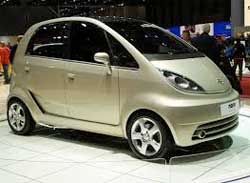
Tata told US business channel CNBC he still had high hopes for the tiny Nano in its home market and abroad.
"A re-launched Nano with some of the differences that we're trying to incorporate, yes I do believe it has good prospects," Tata said. "We are going to relaunch the car not as the cheapest car but with a different image," Tata said, without sayhing when it would be relaunched.
When Tata Motors - part of India's huge Tata group - launched the Nano in 2009, analysts said it would revolutionise how millions in India travelled. But after poor sales, it become clear the car's main selling point, its price, had not seduced the public.
Tata said the branding of the jelly-bean shaped vehicle as the world's cheapest car was a mistake.
"It became termed as a cheapest car by the public and, I am sorry to say, by ourselves," Tata said, calling the branding "unfortunate".
Rather than embracing the Nano, the poorer but still status-conscious customer base that the car was targeting, largely shunned its "cheap" tag and opted for slightly pricier rivals.
The base model initially sold for 100,000 rupees (US$1,600).
"The Nano should have been marketed towards the motorcyclists," said Tata, who trained as an architect and worked closely on the design.
"It was conceived to give people, who rode on two wheels with the whole family, an all-weather, safe form of affordable transport, rather than being the cheapest," he said.

Families of four and five are regularly seen balancing precariously on motorcycles weaving through India's notoriously lethal congested traffic.
"Maybe it could get launched in another country like Indonesia, where it doesn't have the (cheap) stigma and let the new image come back to India," he Tata.
"Or maybe it could be launched as a changed product that gets marketed in Europe. There's a lot of interest in the Nano outside India," Tata said.
Tata Motors, which also produces the successful British luxury Jaguar and Land Rover marques, had aimed to sell around 25,000 Nanos a month. But between April and October, it sold just 12,322 units.
The base model, sold without air conditioning, now costs 145,000 rupees.
Source: AFP via I-Net Bridge

For more than two decades, I-Net Bridge has been one of South Africa’s preferred electronic providers of innovative solutions, data of the highest calibre, reliable platforms and excellent supporting systems. Our products include workstations, web applications and data feeds packaged with in-depth news and powerful analytical tools empowering clients to make meaningful decisions.
We pride ourselves on our wide variety of in-house skills, encompassing multiple platforms and applications. These skills enable us to not only function as a first class facility, but also design, implement and support all our client needs at a level that confirms I-Net Bridge a leader in its field.
Go to: http://www.inet.co.za